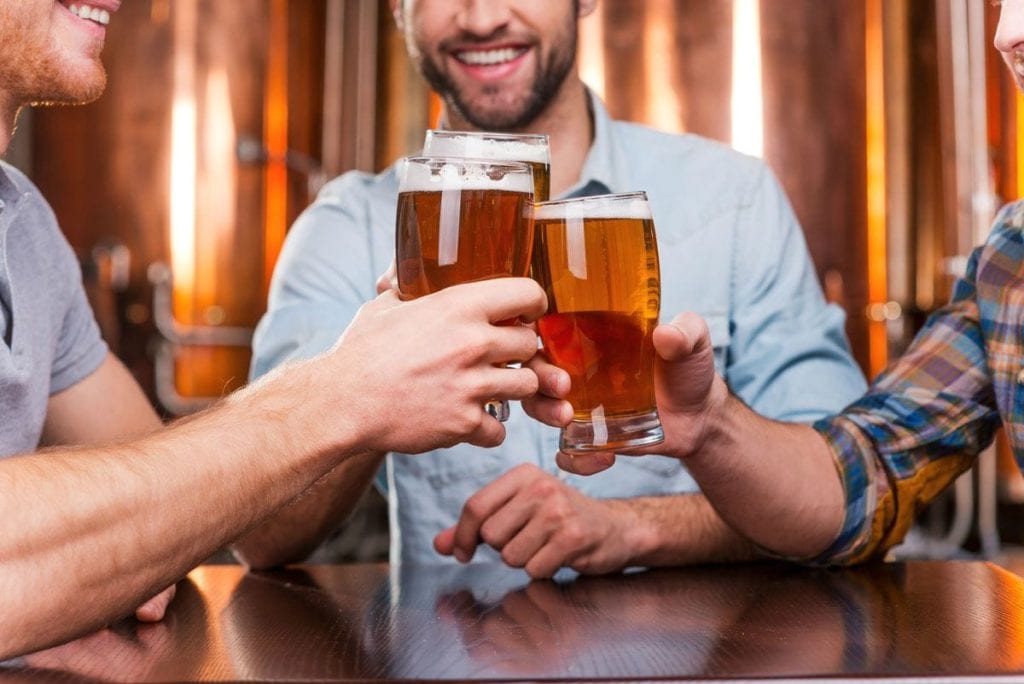You’ve decided to get sober, either as the result of an internal or external desire to turn your life around. Perhaps you were in danger of losing your job, family or freedom. There may have been a compelling thought that “enough is enough.” Your first time out with friends has you in a familiar setting and they are about to order a round of drinks. When you turn down their offer to buy you a beer, the response is, “Oh, come on, one won’t hurt you. What are you, a lightweight?” They may even question your manhood. There you sit with your non-alcoholic drink, perhaps feeling diminished, still wanting to fit in.
Why Would It Matter to Anyone Whether You Drink?
When James Swanwick, an Australian-American investor, TV and podcast host, former SportsCenter anchor on ESPN, and Hollywood correspondent voluntarily became sober, he was confronted with that type of feedback from his friends. He says: “For many guys, drinking is considered a badge of honor. In many cases, it’s how men feel like they can bond. Drinking beer or getting drunk together. So my not drinking posed a threat to some guys. They’d think I was ‘soft’ or ‘weak’ or something like that. Women, on the other hand, were mostly impressed. I think they were thinking, ‘Here’s a man who’s got his life under control.’ They seemed to like that about me.” Swanwick’s perception is that “if one member of a tribe does anything other than the rest, that person may be ostracized. It’s kind of like, “if you’re one of us, you’ll drink.” To be clear, none of my friends were honestly going to un-friend me because I wasn’t drinking. But my actions were remarkably different from the rest of the group. And so maybe they felt threatened or that I was doing something to disrupt the status quo.”
Going on a Bender by Gender
According to the Centers for Disease Control and Prevention, “Men are more likely than women to drink to excess. Excessive drinking is associated with significant increases in short-term risks to health and safety, and the risk increases as the amount of drinking increases. Men are also more likely than women to take other risks (e.g., drive fast or without a safety belt), when combined with excessive drinking, further increasing their risk of injury or death.
- Approximately 63% of adult men reported drinking alcohol in the last 30 days.
- Men (24%) were two times more likely to binge drink than women during the same time period.
- Men average about 12.5 binge-drinking episodes per year, while women average 2.7 binge drinking episodes per year.
- Most people who binge drink are not alcoholics or alcohol dependent.
- It is estimated that 17% of men and 8% of women will meet criteria for alcohol dependence at some point in their lives.
Alcohol as a Social Lubricant for Men
A study examining the connection between consumption of alcoholic beverages and the response level of men to the smiles of peers was highlighted in Clinical Psychological Science, a journal of the Association for Psychological Science. Said lead researcher Catharine Fairbairn: “We wanted to explore the possibility that social alcohol consumption was more rewarding to men than to women — the idea that alcohol might actually ‘lubricate’ social interaction to a greater extent among men.”
How Can Men Stay Sober?
- Let your friends know about your decision to abstain
- Spend time with sober supports
- In early recovery, it may be necessary to avoid being in the presence of alcohol
- Find social activities that don’t involve drinking, such as working out in the gym, soccer teams, cycling clubs, or walking groups
- Volunteer in the community
- Rediscover former hobbies or interests that may have fallen by the wayside when drinking took precedent
- Avoid new romantic relationships early on in your recovery. Standard recommendation in treatment is waiting a year until entering the dating pool
- Be aware of the desire to self-medicate in other ways, such as energy drinks, coffee, smoking, prescription medication or behaviors such as gambling, porn or computer addiction
- Enter into treatment if needed, on an outpatient or inpatient basis
- Explore your perception of what it means to be a man, redefining it if necessary
- Consider who your male role models have been and whether alcohol consumption or alcoholism was/is part of their identity
- Be aware if there is a dual diagnosis/co-occurring disorder, such as depression, anxiety or post-traumatic stress disorder (PTSD) and seek professional support to face it
- Avoid the temptation to isolate
- Be cognizant of your personal relapse triggers
- Speak up if you feel subtly or overtly bullied into drinking
- Get involved with some type of fellowship such as AA, SMART Recovery or Refuge Recovery
- Consider sober living environments such as a halfway house or recovery house
- If you have a spiritual practice or want to engage in one, attend services, pray and read inspirational books
- Join a men’s group
- Make a list of male celebrities who are sober. They include: Russell Brand, Gerard Butler, Ozzy Osbourne, Robert Downey Jr., David Arquette and Bradley Cooper
See your sobriety as a well-earned, if hard won, badge of honor.

